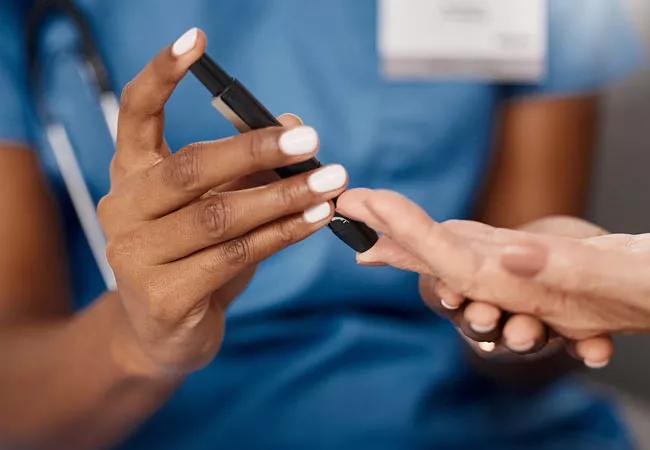Longevity in healthcare, personal experiences may provide caregivers with false sense of confidence

Image content: This image is available to view online.
View image online (https://assets.clevelandclinic.org/transform/f5e6f739-3b9f-45de-8f51-ad7f1ec75e4e/23-NUR-3991019-NN-Rsrch-BasicDiabetesKnowledge-OutptntNurses-CQD_650x450_jpg)
23-NUR-3991019-NN-Rsrch-BasicDiabetesKnowledge-OutptntNurses-CQD_650x450
More than 37 million people in the U.S. have diabetes. In addition to its health ramifications for patients, the chronic condition is a substantial economic burden. Health experts estimate that the cost of diabetes care globally will reach $2.1 trillion by 2030.
Advertisement
Cleveland Clinic is a non-profit academic medical center. Advertising on our site helps support our mission. We do not endorse non-Cleveland Clinic products or services. Policy
The role of nurses in caring for and educating patients with diabetes continues to rise commensurately with the growing prevalence of the disease. This reality has prompted a Cleveland Clinic research study designed to examine the relationship between perceived and actual diabetes knowledge among nurses in ambulatory settings.
Although anecdotal evidence suggested potential knowledge gaps among the healthcare system’s outpatient nursing caregivers, a team of nurse investigators identified a need for specific, actionable data. When an informal initial survey on the management of low blood sugar revealed several educational weaknesses, the researchers were inspired to dig deeper.
“We suspected that a substantial number of nurses were holding onto — and maybe even repeating — outdated or inaccurate information about diabetes, but we wanted to better understand these misperceptions and how they may affect patient care,” explains Shannon Knapp, MEd, RN, CDCES, Manager of Diabetes Care and Education at Cleveland Clinic. “Because diabetes is a common and widely discussed public health issue, it feels familiar to most of us. Unfortunately, that familiarity can lead to a false sense of knowledge or clinical expertise.”
Sue Cotey, RN, CDCES, Ambulatory Care Team Lead, adds that the amount and quality of diabetes education most caregivers receive vary widely, which can further exacerbate knowledge discrepancies.
“When formal education is lacking, we tend to draw on information we’ve gathered through personal experience,” says Cotey, who co-led the study with Knapp. “But anecdotal evidence can lead to erroneous conclusions that should not be used to guide patient care. Our goal was to identify some of the most persistent myths about diabetes so we could find better ways to debunk them.”
Advertisement
Unable to find an existing survey to meet their needs, the Cleveland Clinic investigators created their own tool, the DiaBAK (Diabetes Basics Assessment of Knowledge). The study involved an 11 question survey designed to measure nurses’ actual and perceived knowledge of hypoglycemia treatment, insulin storage, glucose monitoring, health maintenance and food label basics. Nearly 500 RNs, APRNs and LPNs who worked in an ambulatory Cleveland Clinic facility responded.
The research team found a weak relationship between nurses’ perceived and actual knowledge of diabetes basics; many nurses who believed they had adequate diabetes knowledge actually scored poorly on the DiaBAK.
In analysis, caregivers with the highest perceived knowledge were diabetes care and education specialists, nurses with diabetes or with family members or friends with the disease, and nurses who had received diabetes information through continuing nursing education or on-the-job experience.
Caregivers with the highest actual knowledge were diabetes care and education specialists, nurses with diabetes, caregivers who received diabetes-related continuing education within the past five years, and those who had on-the-job experience with the disease. Interestingly, the age of the participants and their number of years in the nursing profession was not a factor in their level of diabetes knowledge.
“Ambulatory care nurses have countless patient interactions throughout the day, and many involve conversations about chronic diseases like diabetes,” notes Melissa Matras, BSN, RN, CNML, Nursing Professional Development Specialist for Ambulatory Nursing Education. “Accuracy is imperative any time you’re sharing clinical information with patients, which is why it’s so important to understand where knowledge gaps exist.”
Advertisement
Knapp adds, “Diabetes is a complex disorder that requires a highly personalized treatment approach. Although every patient manages their disease a bit differently, we must establish and abide by universal standards when providing basic information about the disease to our patients. This study is a step in that direction.”
Cotey, who says the study findings confirm the need for annual competencies in diabetes, hopes the project will serve as a springboard for further education on the disease. In the near future, the team — with support from nursing research mentor Lee Anne Siegmund, PhD, RN, ACSM-CEP — plans to assemble an outpatient diabetes committee that includes healthcare stakeholders from across Ohio.
“The way we manage diabetes is constantly evolving, and nurses must be aware that the information they received 20 years ago may no longer be pertinent,” she explains. “Patients look to us for sound advice, and we want to make sure we can deliver it. By identifying and addressing knowledge gaps and outdated assumptions, we can ensure our patients go home with high-quality information that supports the successful management of their disease.”
Advertisement
Advertisement
Association revises criteria for the diagnosis and resolution of severe conditions
What to consider in the management of euglycemic DKA
Less than 50% of patients with diabetes get appropriate ophthalmic screening through primary care referrals
Familiarity will enhance its accessibility for patients with diabetes
New study counters earlier findings linking drugs with eye disease
Study highlights the value of quantitative ultra-widefield angiography
Maternal-fetal medicine specialists, endocrinologists and educators team up
Spinal cord stimulation can help those who are optimized for success